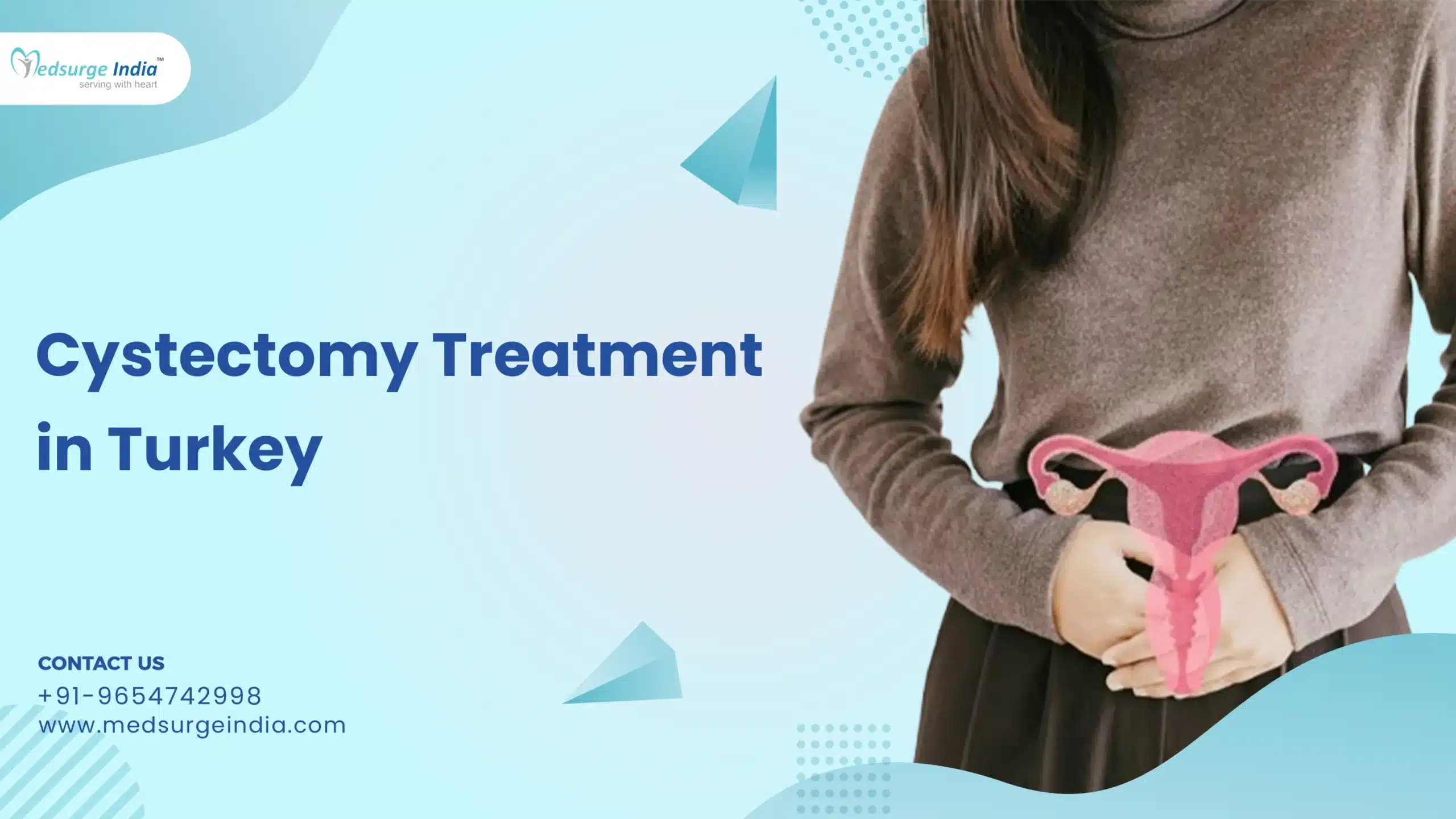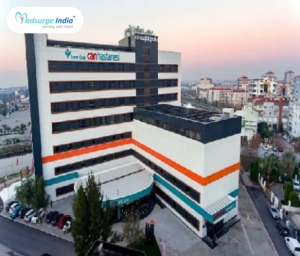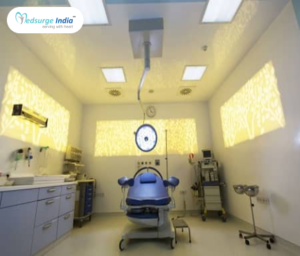Cystectomy Treatment Cost in Turkey
Unlock Exclusive Discount : Your Gateway to Premium Healthcare with Medsurge India Health Value Card.

Unlock Exclusive Discount : Your Gateway to Premium Healthcare with Medsurge India Health Value Card.


Cystectomy, commonly referred to as bladder removal surgery, involves the surgical excision of the urinary bladder. In males, the complete removal of the bladder typically entails the extraction of the prostate and seminal vesicles. For females, the procedure generally includes the removal of the uterus, ovaries, and sections of the vagina.
Turkey has achieved notable advancements in cystectomy care by enhancing access to high-quality healthcare services. With an extensive network of medical facilities, skilled healthcare providers, and cost-effective treatment alternatives, Turkey has greatly enhanced cystectomy treatment compliance and overall patient outcomes.
Cystectomy Treatment cost in Turkey starts from 4000 USD to 13,000 USD varies considerably based on the type of cystectomy, hospital, surgeon’s fees, and patient’s condition.
| Treatment | Prices |
| Open Ovarian Cystectomy | $2,500 – $4,000 |
| Laparoscopic Ovarian Cystectomy | $3,000 – $5,000 |
| Radical Cystectomy | $7,000 – $12,000 |
The selection of a hospital is a crucial factor in influencing the total expenses associated with cystectomy treatment cost in Turkey. Facilities that are high-end and internationally accredited often have higher fees due to their advanced technology, skilled medical personnel, and superior amenities.
Cystectomy, commonly known as bladder removal surgery, is a recognized surgical procedure designed to excise the urinary bladder. In men, this operation typically involves the removal of the bladder along with the prostate and seminal vesicles. For women, cystectomy usually includes the removal of the uterus, ovaries, and a portion of the vagina.
Following the excision of the bladder, the surgeon must establish a urinary diversion to facilitate the storage and expulsion of urine from the body. There are several techniques available for urine management post-surgery, and your physician will recommend the most appropriate option for your situation. Cystectomy is frequently performed to address invasive or recurrent noninvasive bladder cancer, but it may also be indicated for other pelvic tumors.
Cystectomy may be indicated for several reasons, including:
The specific type of cystectomy and subsequent reconstruction will depend on factors such as the reason for the surgery and your overall health status. It is essential to discuss with your surgeon to identify the most appropriate procedure for your needs.
Before your procedure, it is crucial to discuss with your doctor the medications you are currently taking, as well as your intake of caffeine, alcohol, or other substances. Modifications to your medication plan may be required, and refraining from certain substances can facilitate your recovery after surgery.
If you smoke, it is strongly advised to quit before your surgery. Smoking is a recognized risk factor for bladder cancer and can increase the chances of complications during recovery. Once your surgery date is confirmed, you will receive comprehensive instructions on how to prepare effectively.
Depending on your health status, the procedure may be classified into one of the following categories:
Complete recovery can span several weeks to months following the onset of severe symptoms and the subsequent surgical procedure.
The duration of recovery is primarily influenced by the specific type of cystectomy performed. Generally, patients who have a partial cystectomy tend to experience a shorter healing time compared to those who have undergone a radical cystectomy.
Medsurge India collaborates with top urologist surgeons in turkey specializing in cystectomy surgery, boasting extensive experience in handling complex cases and achieving high success rates. We partner exclusively with leading doctors and hospitals in Turkey that possess state-of-the-art medical facilities essential for intricate procedures.
If you have any queries you can submit your medical reports for cystectomy Surgery to Medsurge India. We will provide complimentary medical opinions and treatment plans from the finest urologist surgeons in Turkey. Regardless of your health condition, Medsurge India ensures you receive excellent healthcare options along with cost benefits.
| Estimate Type | Estimated Cost (USD) |
|---|---|
| Total Package Estimate | USD 2,500 – USD 4,000* |
*Final cost depends on hospital, patient condition, and additional procedures/devices if required. Share your reports to get an accurate quote.
Estimated cost range in India: USD 2,500 – USD 4,000*
*For an accurate quote and hospital options, share your reports and preferred city/hospital.
A: The recovery period following a radical cystectomy generally spans eight to twelve weeks. Complete recovery may take several months, even after initial healing has occurred. There are specific measures you can take to support your recovery, and you may notice changes in bowel function compared to before the surgery.
A: The procedure itself does not impact your fertility. However, the underlying condition that necessitated the cystectomy may influence your ability to conceive. If you have concerns about your fertility post-ovarian cystectomy, it is advisable to speak with a healthcare provider.
A: Cystectomy is a complex surgical operation that entails the removal of either a portion or the entirety of the urinary bladder, the organ situated above the urethra and below the kidneys that stores urine until it is expelled. Surgeons typically perform cystectomies to address bladder cancer.
A: Research indicates that patients undergoing radical cystectomy for T1 tumors can achieve disease-free survival rates of up to 92% over ten years. In comparison, those with muscle-invasive disease have a 10-year disease-free survival rate of approximately 64%.

Endourologist
Consultant
20 years of experience
Derindere Hospital, Istanbul
View Doctor
Urologist
Consultant
11 years of experience
Private Duygu Hospital
View Doctor
Urologist
Consultant
14 years of experience
Kolan International Hospital, Istanbul
View Doctor
Urologist
Professor
15 years of experience
Okan University Hospital, Tuzla
View Doctor
Urologist
Consultant
11 years of experience
Medipol University Hospital, İstanbul
View DoctorUrologist and Renal Transplant Specialist
Professor
10 years of experience
KOC University Hospital, Istanbul
View Doctor
Urologist and Renal Transplant Specialist
Professor
15 years of experience
KOC University Hospital, Istanbul
View Doctor
Urologist
Consultant
20 years of experience
Anadolu Medical Center, Kocaeli, Istanbul
View Doctor
Urologist
Consultant
15 years of experience
Kolan International Hospital, Istanbul
View Doctor









By using our site, you agree to our Terms and Conditions, Privacy Policy and Refund Policy. Medsurge India provides reliable healthcare information and treatment options to support informed decision-making. Our content is designed to support and complement the guidance of your treating doctor, helping you feel informed and confident throughout your healthcare journey. We also Accept International Payments.

Copyright © 2025 NSM ONLINE SOLUTIONS PRIVATE LIMITED. All rights reserved.